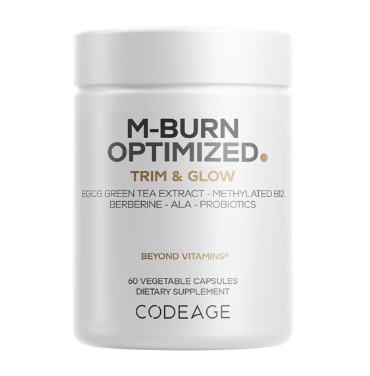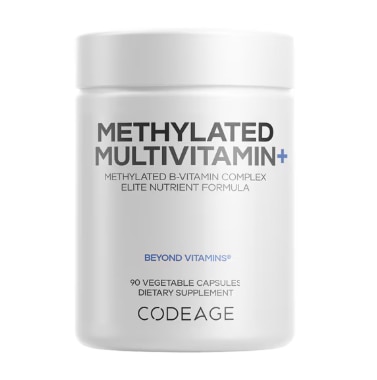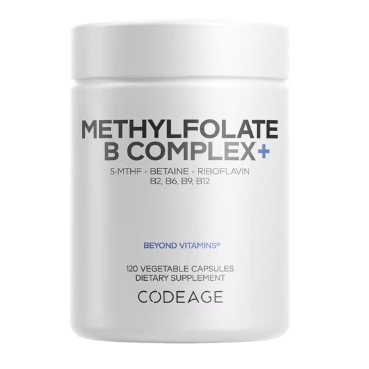Methylated supplements deliver nutrients in a form your body can use right away.† These include active versions of folate and vitamin B12, like 5-MTHF and methylcobalamin, that support a natural process in the body called methylation. Methylation helps with DNA repair, detoxification, neurotransmitter production and more.

Over the last decade or so, methylated supplements have become more popular especially with the rise of personalized nutrition and easier access to genetic testing. People who’ve discovered they carry common MTHFR gene variants may have a harder time converting folic acid into its active form. For them, methylated forms of B vitamins might help maintain healthy folate and B12 levels.†
What is a methyl group?
A methyl group is a simple cluster of one carbon atom and three hydrogen atoms (CH3). In the body, methylation moves these groups from one molecule to another to support essential functions like gene expression, detox pathways and the creation of brain chemicals.
What makes a supplement “methylated”?
Methylated supplements contain nutrients that already have a methyl group attached. This means your body doesn’t have to convert them before using them.† Examples include:
- 5-MTHF (bioactive form of folate)
- Methylcobalamin (active form of vitamin B12)
- Supportive methyl donors like choline, betaine and SAMe
These nutrients work together to support one-carbon metabolism, which is the network behind DNA synthesis, amino acid balance and healthy homocysteine levels.† Keeping homocysteine in a healthy range is linked with cardiovascular health and cognitive health as well as healthy cell growth and repair, and it helps support liver detox pathways.
Folate forms: 5‑MTHF vs folic acid
Folic acid is the synthetic version of folate used in fortified foods (you’ll notice it in most bread ingredient lists) and many supplements. Once absorbed, it needs to be converted into 5-MTHF so your body can use it. Some people can convert folic acid into this active form and some people can’t, especially those with MTHFR variants.†
Supplementing with 5-MTHF bypasses the conversion step to give you a direct active source of folate to support healthy folate levels.† Research shows both folic acid and 5-MTHF raise folate levels in the body and means there is less unmetabolized folic acid in the body that can’t be used.†
For pregnancy, folic acid is still the form proven to reduce neural tube defects, so if you’re pregnant or trying to conceive, follow your healthcare provider’s guidance on folic acid. Outside pregnancy, 5-MTHF is a good alternative for personalizing your supplement stack.†
Vitamin B12 forms: Methylcobalamin vs cyanocobalamin
Both methylcobalamin and cyanocobalamin can help keep vitamin B12 levels healthy. After you absorb B12, your body turns it into the active forms it uses in cells, so the name on the label is only part of the picture. Cyanocobalamin is very stable and well studied. Methylcobalamin is often sold as an “active” form. For most people, getting enough B12 regularly, the right dose, and good absorption matter more than the specific form.
People at risk of low B12, like vegans and vegetarians, older adults and people taking metformin or acid-suppressing drugs, can benefit from regular checks and a plan they can follow to make sure they’re getting enough. Oral, sublingual and chewable supplements can all be helpful if you use them consistently.† If blood tests are low or symptoms point to low status, a clinician can help choose the ideal dose and delivery.
Who might consider methylated supplements?
Methylated supplements aren’t necessary for everyone, but they can be ideal for people who want forms their body can use right away.† They may be worth considering for:
- People with common MTHFR gene variants who prefer 5-MTHF to help maintain folate status (work with a healthcare provider if pregnant or trying to conceive)†
- Vegans and vegetarians, older adults, and anyone taking medicines that can affect B12 (for example, metformin or acid-suppressing drugs)†
- Those choosing a B-complex aimed at energy metabolism and maintaining healthy homocysteine levels†
- Anyone who has tried standard forms and wants an option that better fits their plan and lab results†
If you’re unsure, bring your supplement label and recent lab results to a qualified professional for guidance.
Safety, side effects and serving size
Most people tolerate B vitamins well at typical supplement serving size, and more isn’t always better, so follow the label unless your healthcare provider advises otherwise. If you use folate, it’s a good idea to pair it with B12 because high folate can hide signs of low B12. Keep an eye on both, especially if you’re vegan or vegetarian, older or taking metformin or acid-suppressing medicines.†
If you’re new to methylated supplements, start with a smaller amount and see how you feel before increasing it. If you’re pregnant or trying to conceive, follow clinical guidelines on folic acid to help prevent neural tube defects. And as you choose products, look for third-party testing, clearly listed forms such as 5-MTHF and methylcobalamin, and doses that stay within established safe ranges.†
How to choose a quality methylated supplement
Look for the form, amount and quality that matches your needs.
- Forms: Look for 5-MTHF (folate) and methylcobalamin (B12). If you add folate, include B12.
- Supportive nutrients: A balanced B-complex with B2 and B6, plus betaine or choline, supports everyday one-carbon metabolism.†
- Quality: Choose brands with third-party testing, cGMP manufacturing and clear lot/batch details.
- Stability: Stabilized forms and packaging that protects light- or heat-sensitive ingredients improves potency.†
- Delivery: Pick a form you’ll take consistently like capsule, tablet, powder or liposomal and check if they are vegetarian, allergen and additive friendly if you necessary.
For a simple daily option, Codeage Methylated Multivitamin provides methylated Bs, minerals, and supportive nutrients for everyday coverage. For targeted folate and B12, Codeage Methylfolate B-Complex helps maintain one-carbon metabolism and healthy homocysteine levels. For non-stimulant metabolic support, Codeage M-Burn combines B12 with researched botanicals. Be sure to check with your healthcare provider if you take medications.
What this means for you
Methylated vitamins can help support healthy methylation and nutrient levels for some people, but the benefits depend on your needs, the amount and product quality. For pregnancy and preventing neural tube defects, folic acid is still the proven public-health choice. If you’re unsure, bring your supplement label to your healthcare provider and create a plan together.
†These statements have not been approved by the Food and Drug Administration. These products are not intended to diagnose, treat, cure or prevent disease.
Featured Products



The post What are ‘Methylated Vitamins’ – and Why Consider Taking Them? first appeared on The Upside by Vitacost.com.
